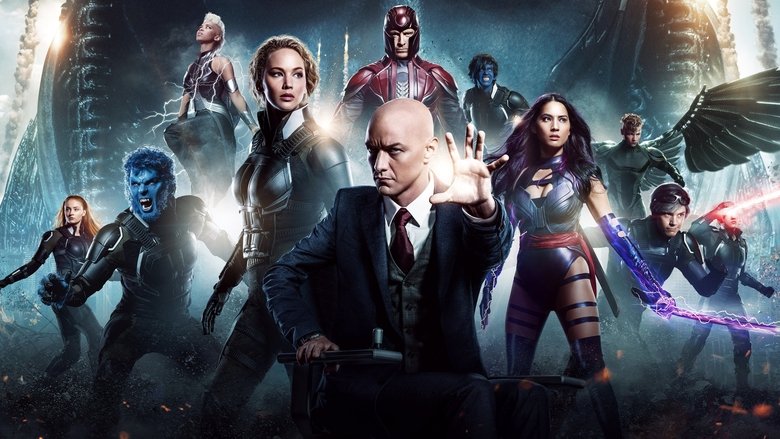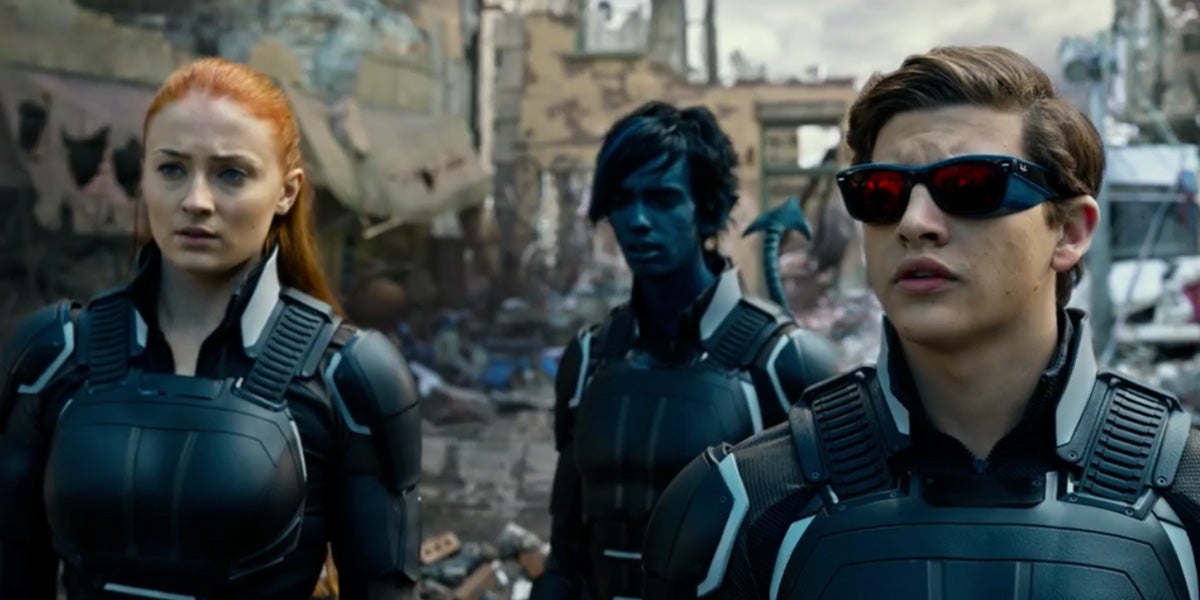← Back to Reviews

in
#174 - X-Men: Apocalypse
Bryan Singer, 2016

In 1983, a team of super-powered mutants comes together in order to defeat an ancient mutant who wishes to dominate the world.
It's common for long-running cinematic franchises to reference their own longevity, whether through off-hand remarks or actually using it as a thematic concern that informs the narrative. X-Men: Apocalypse marks the eighth film in a franchise (ninth if you count Deadpool) that has run for almost two decades and featured sequels, prequels, spin-offs, and combinations of the three, yet it is decidedly uninterested in acknowledging its age (this is reflected in multiple recurring characters looking virtually the same as they did in 2011's First Class despite that film taking place over twenty years before this one does). It does seem rather relevant when one considers the franchise's fluctuating levels of quality over the years; the original X-Men may have served as a blueprint for the post-millennium superhero movie, but with the rise of various challengers ranging from Christopher Nolan's Batman series to the entire Marvel Cinematic Universe, it's hard not to think of it as the old man on the block in comparison. The recent uptick in the franchise's popularity courtesy of recent prequels First Class and Days of Future Past really puts the pressure onto Apocalypse to deliver a worthy third installment in this particular trilogy (which the filmmakers are aware of to the point of including a throwaway gag involving bad sequels).
Rather than set up a relatively complex narrative involving espionage or time travel, X-Men: Apocalypse instead opts to go for broke and doubles down on the franchise's comic-book roots by introducing a major villain in the form of the eponymous mutant (Oscar Isaac), who ruled ancient Egypt as a living god before some rebellious humans manage to trap him for several millennia. Of course, he is eventually disinterred and brought forth into the brave new world of 1983, where he plans to remake the world in his image and eliminate anyone who would seek to stop him. As such, the film introduces and re-introduces the various heroic and less-than-heroic players from the franchise as they have scattered across the world. Recurring characters like Mystique (Jennifer Lawrence) and Magneto (Michael Fassbender) are working as an underground freedom-fighter and living a quiet family life respectively. Meanwhile, younger versions of familiar characters like Cyclops (Tye Sheridan) and Jean Grey (Sophie Turner) are busy learning to cope with the onset of their own considerable powers and how to fully control them under the combined tutelage of Professor X (James McAvoy) and Beast (Nicholas Hoult). The stage is then set for an epic conflict - perhaps a little too set, as a good chunk of this rather long film is dedicated to preamble that tends to feels too obligatory and overdone (especially in regards to Magneto's own sub-plot, where Fassbender's trademark intensity barely salvages an extremely thin stab at serious drama). Given the need for a stronger villain than usual, even Apocalypse himself does not feel especially compelling as an antagonist; the manipulative cult-leader vibe is a nice touch, but Isaac's usual charisma still ends up being buried under distorted vocals and copious amounts of makeup.
A common complaint with superhero movies is one rooted in dramatic irony - if the villain's goal is to take over and/or destroy the world, then it's hard to feel especially invested in the hero's struggle against the villain since we know deep down that the world won't really end due to the villain's plot. There are definitely smaller conflicts and stakes at work, but they do fail to prove interesting more often than not. It is good to see the film actually try to build off previous installments - just compare this film's handling of Quicksilver (Evan Peters) against his appearance in Days of Future Past - but it's just as likely to fall into old traps as it feels compelled to cram in as many different elements as possible in order to conform to some sort of epic ideal (most notably by shoehorning in a prolonged sequence of events that serves as an extended call-back to one of the franchise's better films). If nothing else, the fact that Singer is behind the camera again means that the resulting action manages to look fairly polished (perhaps too polished) as it involves everything from one-on-one punch-ups to scenes of global catastrophe. The balancing out of the various moments of action is a challenge, especially as the number of combatants grows with each cumulative battle and the editing is put under extra strain to keep things moving as smoothly and as coherently as possible. In this regard, Apocalypse does okay, though the resulting tension is squandered a bit as the fights go on and on until it's just one more reason that you wish this already overlong movie would be over sooner.
If I had to summarise X-Men: Apocalypse in a single word, it would be "weightless". I can't imagine that those who are unfamiliar with X-Men would get too much out of it beyond a fairly flashy sci-fi blockbuster, but I don't think that having seen the previous installments will automatically allow for a significantly greater appreciation. The final product looks as slick as ever, but it's lacking in the bombast necessary to make an impression for better or worse. Smaller moments of character development and larger moments of effects-heavy action do what they can to flesh out yet another exploration of the same social justice metaphor that has been picked fairly clean over the course of eight movies. I don't automatically consider it to be the worst movie in the series - it's at least somewhat competent and doesn't do too much to break your suspension of disbelief - but it's still too inconsequential despite its attempts to incorporate both personal nuance and astounding spectacle into the proceedings.
Bryan Singer, 2016

In 1983, a team of super-powered mutants comes together in order to defeat an ancient mutant who wishes to dominate the world.
It's common for long-running cinematic franchises to reference their own longevity, whether through off-hand remarks or actually using it as a thematic concern that informs the narrative. X-Men: Apocalypse marks the eighth film in a franchise (ninth if you count Deadpool) that has run for almost two decades and featured sequels, prequels, spin-offs, and combinations of the three, yet it is decidedly uninterested in acknowledging its age (this is reflected in multiple recurring characters looking virtually the same as they did in 2011's First Class despite that film taking place over twenty years before this one does). It does seem rather relevant when one considers the franchise's fluctuating levels of quality over the years; the original X-Men may have served as a blueprint for the post-millennium superhero movie, but with the rise of various challengers ranging from Christopher Nolan's Batman series to the entire Marvel Cinematic Universe, it's hard not to think of it as the old man on the block in comparison. The recent uptick in the franchise's popularity courtesy of recent prequels First Class and Days of Future Past really puts the pressure onto Apocalypse to deliver a worthy third installment in this particular trilogy (which the filmmakers are aware of to the point of including a throwaway gag involving bad sequels).
Rather than set up a relatively complex narrative involving espionage or time travel, X-Men: Apocalypse instead opts to go for broke and doubles down on the franchise's comic-book roots by introducing a major villain in the form of the eponymous mutant (Oscar Isaac), who ruled ancient Egypt as a living god before some rebellious humans manage to trap him for several millennia. Of course, he is eventually disinterred and brought forth into the brave new world of 1983, where he plans to remake the world in his image and eliminate anyone who would seek to stop him. As such, the film introduces and re-introduces the various heroic and less-than-heroic players from the franchise as they have scattered across the world. Recurring characters like Mystique (Jennifer Lawrence) and Magneto (Michael Fassbender) are working as an underground freedom-fighter and living a quiet family life respectively. Meanwhile, younger versions of familiar characters like Cyclops (Tye Sheridan) and Jean Grey (Sophie Turner) are busy learning to cope with the onset of their own considerable powers and how to fully control them under the combined tutelage of Professor X (James McAvoy) and Beast (Nicholas Hoult). The stage is then set for an epic conflict - perhaps a little too set, as a good chunk of this rather long film is dedicated to preamble that tends to feels too obligatory and overdone (especially in regards to Magneto's own sub-plot, where Fassbender's trademark intensity barely salvages an extremely thin stab at serious drama). Given the need for a stronger villain than usual, even Apocalypse himself does not feel especially compelling as an antagonist; the manipulative cult-leader vibe is a nice touch, but Isaac's usual charisma still ends up being buried under distorted vocals and copious amounts of makeup.
A common complaint with superhero movies is one rooted in dramatic irony - if the villain's goal is to take over and/or destroy the world, then it's hard to feel especially invested in the hero's struggle against the villain since we know deep down that the world won't really end due to the villain's plot. There are definitely smaller conflicts and stakes at work, but they do fail to prove interesting more often than not. It is good to see the film actually try to build off previous installments - just compare this film's handling of Quicksilver (Evan Peters) against his appearance in Days of Future Past - but it's just as likely to fall into old traps as it feels compelled to cram in as many different elements as possible in order to conform to some sort of epic ideal (most notably by shoehorning in a prolonged sequence of events that serves as an extended call-back to one of the franchise's better films). If nothing else, the fact that Singer is behind the camera again means that the resulting action manages to look fairly polished (perhaps too polished) as it involves everything from one-on-one punch-ups to scenes of global catastrophe. The balancing out of the various moments of action is a challenge, especially as the number of combatants grows with each cumulative battle and the editing is put under extra strain to keep things moving as smoothly and as coherently as possible. In this regard, Apocalypse does okay, though the resulting tension is squandered a bit as the fights go on and on until it's just one more reason that you wish this already overlong movie would be over sooner.
If I had to summarise X-Men: Apocalypse in a single word, it would be "weightless". I can't imagine that those who are unfamiliar with X-Men would get too much out of it beyond a fairly flashy sci-fi blockbuster, but I don't think that having seen the previous installments will automatically allow for a significantly greater appreciation. The final product looks as slick as ever, but it's lacking in the bombast necessary to make an impression for better or worse. Smaller moments of character development and larger moments of effects-heavy action do what they can to flesh out yet another exploration of the same social justice metaphor that has been picked fairly clean over the course of eight movies. I don't automatically consider it to be the worst movie in the series - it's at least somewhat competent and doesn't do too much to break your suspension of disbelief - but it's still too inconsequential despite its attempts to incorporate both personal nuance and astounding spectacle into the proceedings.
